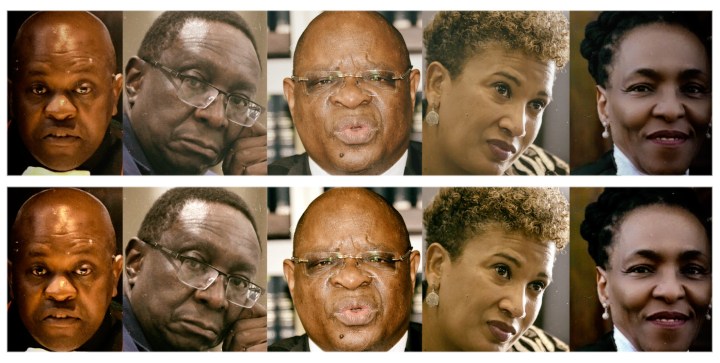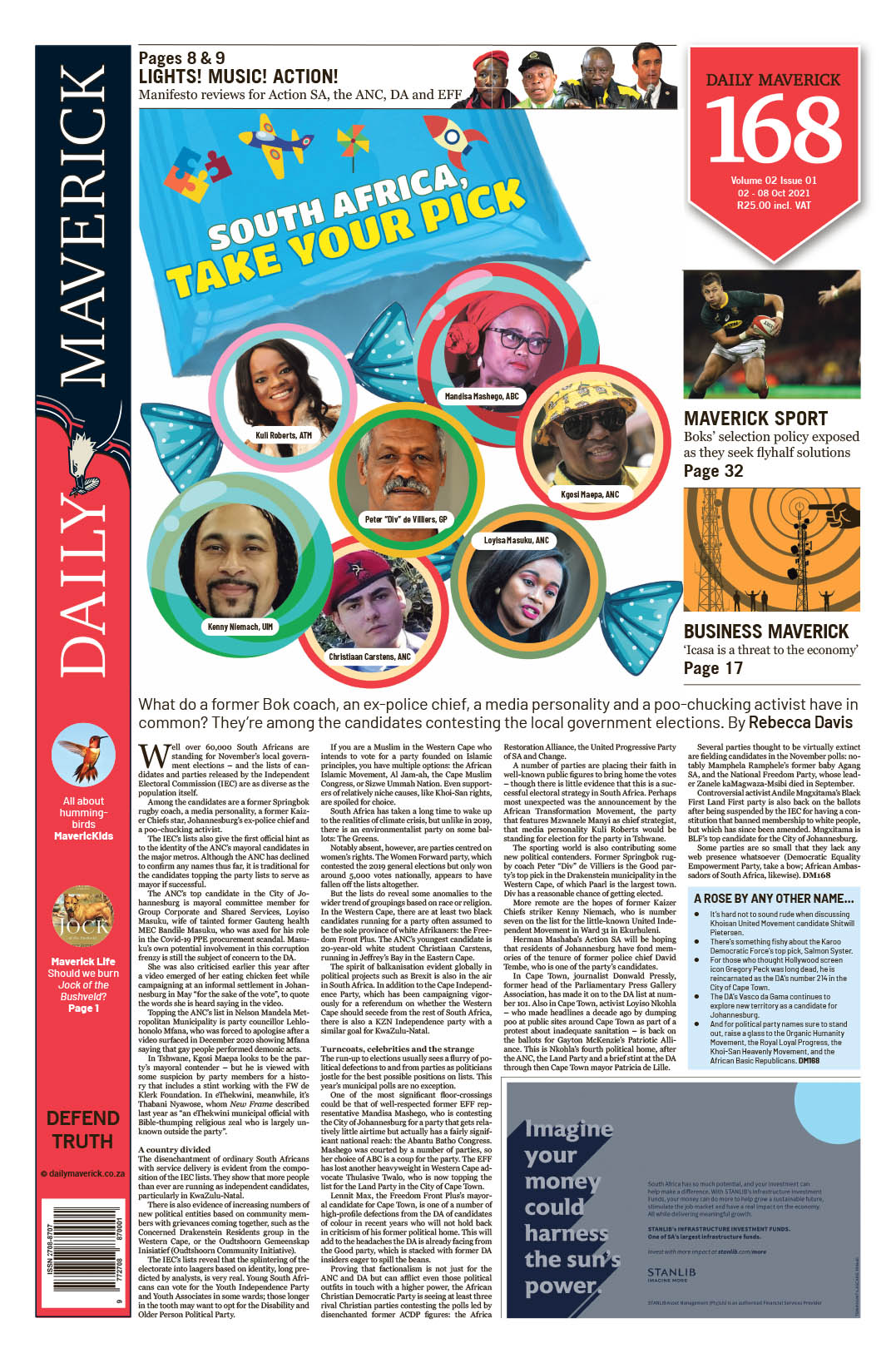DM168 JUDICIARY IN CRISIS
Concerns that advisory panel pondering South Africa’s next chief justice is ‘too political’

Top judge should be a solid jurist and administrator, and ready to fight for judicial independence.
First published in the Daily Maverick 168 weekly newspaper.
After watching the somewhat vicious, public interrogation that judges vying for positions on the Constitutional Court underwent earlier this year, one may wonder why anyone would want the role of South Africa’s top judge.
It’s a lucrative position – the person who takes over from Chief Justice Mogoeng Mogoeng will earn upwards of R2.8-million per year for leading South Africa’s courts.
The role doesn’t simply require a strong jurist, however, but also a strong administrator as well as someone who is prepared to stand up for the country’s judges.
The Constitution calls for the President to appoint the chief justice and deputy chief justice, after “consulting” with the Judicial Service Commission and leaders of the parties represented in the National Assembly.
Unfortunately, the Constitution’s wording is vague on the exact process the President should undertake in his selection and consultation, leaving it open for the head of the executive to make it up as he goes along.
President Cyril Ramaphosa has appointed a panel of experts, led by Navi Pillay, a former judge at the International Criminal Court. Other panellists include former public protector Thuli Madonsela, co-chair of the SA National Aids Council Mmapaseka Steve Letsike, and Ziyad Motala, who is professor of law at Howard University in the US.
Nominations for candidates closed on 1 October and the Presidency said it would publish the names of all nominees by 4 October. Interested parties will have until 15 October to comment on the candidates before the panel provides a shortlist of three to five names to Ramaphosa.
While the decision to hold an open and consultative process has been welcomed, some commentators have questioned his selection of panellists as it comprises both current Justice Minister Ronaldo Lamola as well as former minister Jeff Radebe.
The board of Freedom Under Law, a not-for-profit organisation established to promote democracy under law, has written to Ramaphosa, asking him to change the composition of the panel, taking particular issue with the inclusion of Lamola and Radebe.
“This last request arises from the concerns that Freedom Under Law has publicly expressed regarding the advisory panel you have appointed.
“It comprises not one but two party-political appointees (a former minister who, until last week, headed the ruling party’s election committee being added to a current minister); an inexplicable appointee from academic ranks; no serving or recently retired judge able to advise on the current state and needs of the judiciary; and no one drawn from the senior ranks of the legal profession,” the board says in its letter dated 23 September.
“The composition of the panel has not enhanced but detracted from confidence in the process. We respectfully call upon you to remedy this.”
The composition of the panel was no minor issue, Freedom Under Law chief executive Nicole Fritz told DM168, arguing that it could taint the process completely.
“If you load the panel with too many political appointees, that is a concern. There are other issues about who was left off the panel.
“Our judiciary is embattled and is being impugned by a diverse group of political actors. At the end of this month, there will be only six permanent members of the Constitutional Court. So you need exemplary leadership. The chief justice is not only going to be in charge of management of the apex court but also the entire judicial system.
“For the panel not to have any recently retired justice who might be able to speak to the dynamics of the judiciary [is a concern]. The panel also could have had members from the legal profession,” Fritz said.
These concerns are shared by Lawson Naidoo, executive secretary of the Council for the Advancement of the Constitution.
“It would have been beneficial to have a former Constitutional Court Judge on that panel. You do need someone who can bring that internal perspective on the operation of the court,” he said.
The role of SA’s top judge is about more than ensuring that judgments flow timeously from the Bench of the ConCourt. The chief justice also acts as the head of the third arm of the state, as initially intended by the Constitution, managing a budget for the judiciary, ensuring technical needs of courts are met and also heading the Judicial Service Commission. The commission appoints and disciplines judges, making it one of the judiciary’s most important institutions. “The successful candidate is going to have to combine a number of attributes. They will have to be an effective manager and administrator in addition to being a sound judge,” Naidoo said. “The issue of respect from among their peers will also be important because the judiciary has come under fire recently.”
In its letter to Ramaphosa, Freedom Under Law notes some of the recent issues the judiciary has faced, saying a “failure to make timeous appointments” to the ConCourt had left “crucial decisions” to be “made by untenured acting members of that Court.
“Its integrity has been publicly impugned, its leader’s conduct questioned. Its divisions and tensions have spilled into its judgments,” the board writes.
Against this backdrop, the Freedom Under Law board suggests Ramaphosa’s panel adopts criteria crafted by Professor Hugh Corder as an “unofficial roadmap” in their selection process.
Corder, professor emeritus of public law at the University of Cape Town, set out six key criteria for the selection of the chief justice.
In an article for The Conversation, Corder writes that the chief justice should be “an intellectual leader on the Bench, enjoying the respect of their peers in the superior courts” and “a clear proponent of the transformative nature of the entire constitutional framework, with a jurisprudential track record to back up such a stance”.
The other four criteria are:
- A proven capacity to lead the judiciary as a whole;
- An impressive record as a manager, preferably within the administration of justice;
- The fulfilment of formal commitments with total impartiality and skill, all the while guarding against attempts to undermine the judicial institution; and
- The manifest ability credibly to engage the general public, reassuring it of the fair-minded, principled, fearless and incorruptible nature of those appointed as judges, and of the superior court system as a whole.
The contenders
Naidoo mentioned that there was early speculation about the top contenders.
Predictably, Deputy Chief Justice Raymond Zondo’s name has been suggested, partly due to the profile his service at the State Capture commission has provided. But the commission could also prove to be a curse as Zondo has spent very little time sitting on the ConCourt Bench since being seconded to the commission in 2018.
Supreme Court of Appeal (SCA) Judge President Mandisa Maya is another favourite. Some in the magistrates’ profession apparently hoped to lobby for her selection, considering her seniority and ongoing work as a strong advocate for gender parity on the Bench.
Justice Leona Theron, who has served on the Constitutional Court since July 2017, is another contender. She has also served as a judge at the SCA and the High Court in KwaZulu-Natal.
ConCourt Justice Mbuyiseli Madlanga has also emerged as a possible contender for the job. This is his second stint in the judiciary after he resigned from the Bench to return to private practice. During that time, he was the chief evidence leader at the Marikana Commission of Inquiry. His elevation to the ConCourt in April 2013 was somewhat unusual as he went directly from the advocate’s profession to the country’s highest court, a path not often followed.
Gauteng Judge President Dunstan Mlambo is also seen as a contender, having headed up one of the largest courts in the country. The High Court in Gauteng has two busy divisions, one in Pretoria and one in Johannesburg, which could place Mlambo in good standing from an administrative perspective.
Once comments have been received by the panel, they will have to report to Ramaphosa by 29 October with a final shortlist. Ramaphosa will then decide which candidates to submit to the Judicial Service Commission and leaders of political parties. DM168
UPDATE Tuesday, 5 October, 2021:
On Monday 4 October, the Presidency released the list of candidates who have been nominated by the public. The list includes those previously identified as forerunners: Judges Zondo, Maya, Madlanga and Mlambo.
There are four additional candidates including Western Cape Judge President John Hlophe, who is currently facing impeachment after being found guilty of misconduct. The current Public Protector has also been nominated. Mkhwebane has recently had a tough time legally, losing several cases in court.
The seventh candidates are AYO Technology Solutions Chairperson Dr Wallace Mgoqi, who is a former City Manager for the City of Cape Town and a former Chief Land Claims Commissioner.
Advocate Alan Nelson SC is the eighth candidate and is a conflict resolution specialist and mediator. Nelson spent the majority of his legal career as a member of the Cape Bar in the Western Cape.
The president appears to have taken some of the input provided by Freedom Under Law to heart and has released terms of reference for the panel, along with “appointment criteria”.
In addition to meeting the constitutional requirements of being “fit and proper”, the Presidency has said the new head of the judiciary should demonstrate the ability and capacity to “defend, protect and uphold the Constitution.”
The criteria also requires the incumbent to “create a conducive environment for asserting the independence of the judiciary and respect for the separation of powers; lead and spearhead South Africa’s transformative jurisprudence geared for the advancement of social justice and access to justice; and promote a culture of work ethic geared to meet the acceptable judicial performance standards and standards of accountability.”
Ramaphosa has also added another topic under the headline of “Judicial Competence” saying the Chief Justice should “demonstrate a level of sensitivity and objectivity towards equality in terms of race, gender, persons with disabilities, LGBTI people and other vulnerable groups.” DM
This story first appeared in our weekly Daily Maverick 168 newspaper which is available for R25 at Pick n Pay, Exclusive Books and airport bookstores. For your nearest stockist, please click here.




















the fact the CR has approved Hlope and Mkhwebane shows he is not at all interested in sorting out the rot in the Govt or justice system. Disgraceful.
LOL I hope we get Mkhwebane!
That will just be another case of getting what we deserve.